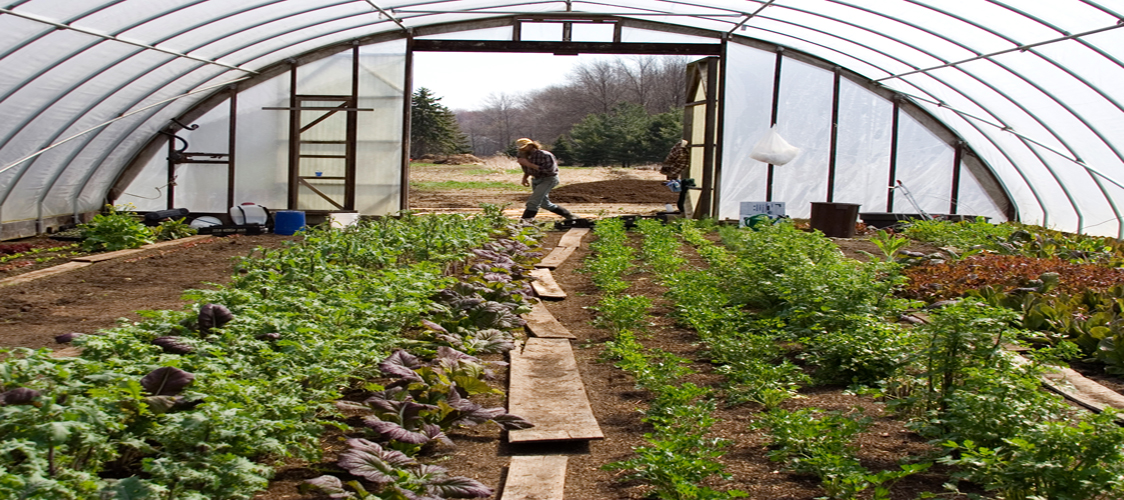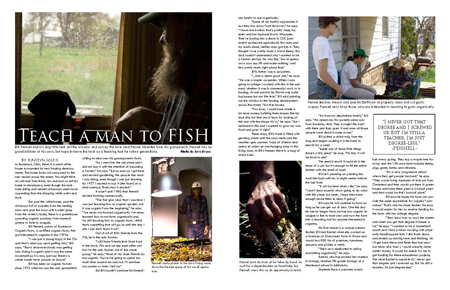
In Rootstown, Ohio, there is a small white house surrounded by new housing developments. The house looks old compared to the new model across the street. You might think an old man lives there, too stubborn to sell his home to developers, even though the laminate siding and cement driveways seem more appealing than the chipping white paint and mud.
But past the white house, past the driveway full of puddles from the melting snow and past the barn with broken glass from the winter's icicles, there is a greenhouse sprouting organic produce, from mustard greens to kale to arugula.
Bill Pennell, owner of Rootstown Organic Farm, a certified organic farm, first got interested in organics in the 1970s.
“I was just a young hippy in the 70s and that’s what you were getting into,” Bill says. “That’s what everybody was getting into. Doing it organic and it was the same movement as it is now, just now there’s a whole bunch more people on board.”
Bill has been an organic farmer since 1975 when he was the only grandchild willing to take over his grandparent’s farm.
“So I went into the old place and I did not buy it with the intention of becoming a farmer,” he says. “But as soon as I got here and started gardening, the people like what I was doing, even though I was just learning. By 1977 I started to buy it (the farm) on a land contract. That’s how it started.”
It wasn’t until 1980 that Pennell started farming commercially.
“The first give year that I was here I was just learning how to organic garden, but it was organic from the beginning,” he says. “I’ve never not farmed organically. I’ve never learned how to not farm organically and I’m still learning how to organic farm. I think that’s something that will go on until the day I die. I just can’t learn it all.”
Out of all of Bill's friends from the 70s, he is the only farmer.
"I still have friends that I had back in the early 70s and we see each other yet but I'm the only farmer out of the whole group," he says. "Most of my close friends do eat organic. You're not going to spend too much time around me and not. I'll convince you sooner or later I tell ya."
But Bill couldn't convince his immediate family to eat organically.
"Some of my family appreciate it but they live away from here now," he says. "I have one brother that's pretty close, my sister and her husband live in Wisconsin. They're buying into a share in CSA (community sponsored agriculture). My mom and my dad's dead, neither ever got into it. They thought I was pretty much a black sheep. My dad couldn't understand why I wanted to be a farmer period. He was like, 'you're gonna work your ass off and make nothing,' and he's pretty much right about that."
Bill's father was a carpenter.
"...And a damn good one," he says. "He was a master carpenter. When I was going to college I worked with him in the summers, whether it was in commercial work or in housing. At one point in his life he was building houses but not like that," Bill said pointing out the window to the housing development across the street, "but nice houses.
"You know, I could have made a lot more money building them houses like my dad did, not that you’d know by looking at this one with the shape it's in," he says. "But I believed in this and I wanted to grow my own food and grow it right."
These days, Bill’s home is filled with germing plants until the snow melts and the weather gets warmer. Trays of cilantro and celery sit under an overhanging lamp in the living room. In Bill’s freezer there is a bag of dried basil.
“It’s from my stepfathers family,” Bill says. “He raised me. His parents came over from Ravenna, Italy. They brought this basil with them and they grew it and once all those people were dead it came to me.”
Bill pulled a dried twig from the bag and began crushing it in his hand to search for a seed.
“Inside one of those little things there’s a tiny seed,” he says. “It’s tiny. It will be hard to see.”
The seed is small. It could sit in the head of a pin but it’s enough to fill the entire kitchen with the smell of basil.
Bill isn’t planning on planting the basil heirloom until six to eight weeks before the last frost.
“It will be here when I die,” he says. “I don’t know exactly who’s going to do what with this place but yeah, I hope they have enough about them to keep it going.”
Bill says he will continue to farm as long as he can get out of bed. One the day he can no longer farm, he has two organic biologists in line to take over and turn the farm into a learning tool for anyone interested in organics.
His first choice is a woman named Rachel. Bill met Rachel when she worked as a foreman on Silvercreek Farm in Hiram and would buy 800 lbs of potatoes, tomatoes, peppers and pickles a week.
"She's very dedicated to doing everything organically," he says.
Rachel, who has earned her masters in biology, teaches 9th grade biology at a Montessori school in Ashtabula.
Students have a pancake breakfast every spring. They tap a maple tree for syrup and the 100-acre land includes sheep, pigs, goats, lambs and chickens.
"It's a very progressive school where they get people involved," he says. "They would bring busloads of kids out from Cleveland and they would put them in greenhouses and have them plant a broccoli plant and that would be their broccoli plant."
Bill says he hopes his farm can provide the same experience for organic "wannabes." That's why he chose Rachel. He says it would easier for her to receive funding for the farm with her college degree.
"They know how to work the system and when you got that degree it means a lot," he says. "I wanted to be a basketball coach and I had a minor working with physically handicapped kids. I did three years and ended up moving here and thinking, 'oh I'll get back there and finish that last year' but never did. Had I, I could actually make better money. It would be easier for me to get funding for these educational projects, like what Rachel is capable of. I never got that degree and I screwed up. But I'm still a teacher, I'm just degree-less."
 |
ooo | ||||||||
|---|---|---|---|---|---|---|---|---|---|
Teach a Man to Fish from Sara Graca on Vimeo. |
One Ohio farmer hopes to use his organic farm as a teaching tool for students and “wannabe” organic farmers.
|
||||||||
|---|---|---|---|---|---|---|---|---|---|
 |
|||||||||
2010 © Sara Graca |
|||||||||